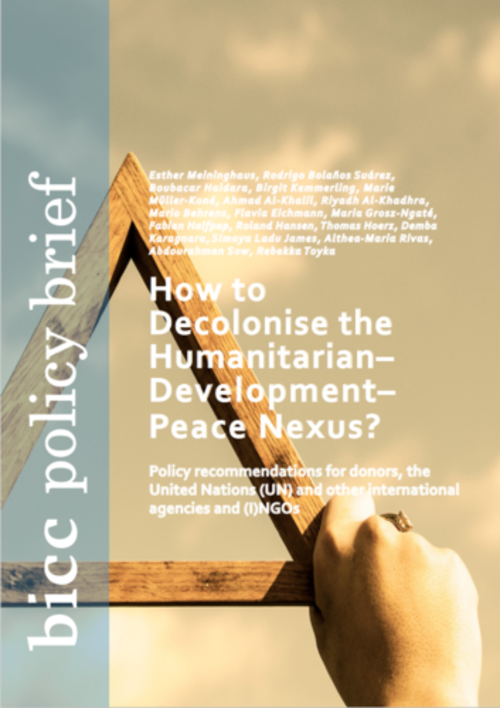Publications
How to Decolonise the Humanitarian–Development–Peace Nexus?
Policy Recommendations for Donors, the United Nations (UN) and other International Agencies and (I)NGOs
Release Date
2024
Language
- English
Topics
- Building Peace and Social Cohesion
Recent calls to decolonise aid from within (I)NGOs in the aid sector stem from a fundamental critique of the international aid system that emerged from the Black Lives Matter (BLM) movement in 2020. The decolonial critique draws attention to power imbalances and structural racism that can be traced back to the colonial era. These colonial legacies continue to permeate the international humanitarian system, most visibly in the dominance of international (non-)governmental organisations that shape the aid structure. The “decolonise aid” debate has been taken up by humanitarian, development and peacebuilding organisations. It is broadly defined as a process of reflection, critical analysis and action that identifies and dismantles such power imbalances and structural racism in order to work towards a more equitable aid system that focuses on the shared humanity of all staff and the communities they serve.
The decolonial critique is particularly relevant to the HDP nexus: The HDP nexus debate emerged around the 2016 World Humanitarian Summit (WHS) as part of the “New Way of Working”, which means better integrating ‘local’ governmental and non-governmental aid actors into the humanitarian system. In line with the Grand Bargain, an agreement that emerged from the WHS, signatories are supposed to work towards “collective outcomes” and “localisation” in a bottom-up approach through joint analysis and direct access to funding for these local actors. The authors argue that the current implementation of the HDP nexus fails to address power asymmetries and structural inequalities in the international aid system. Beyond a bottom-up approach to localisation, they call for a decolonial rethinking that analyses and acknowledges how colonial legacies affect funding flows, the distribution of staff and decision-making power, as well as norms and attitudes within the aid sector.
PDF-Download

Cite as
Document-Type
BICC Policy brief
Publisher
bicc
Place
Bonn



